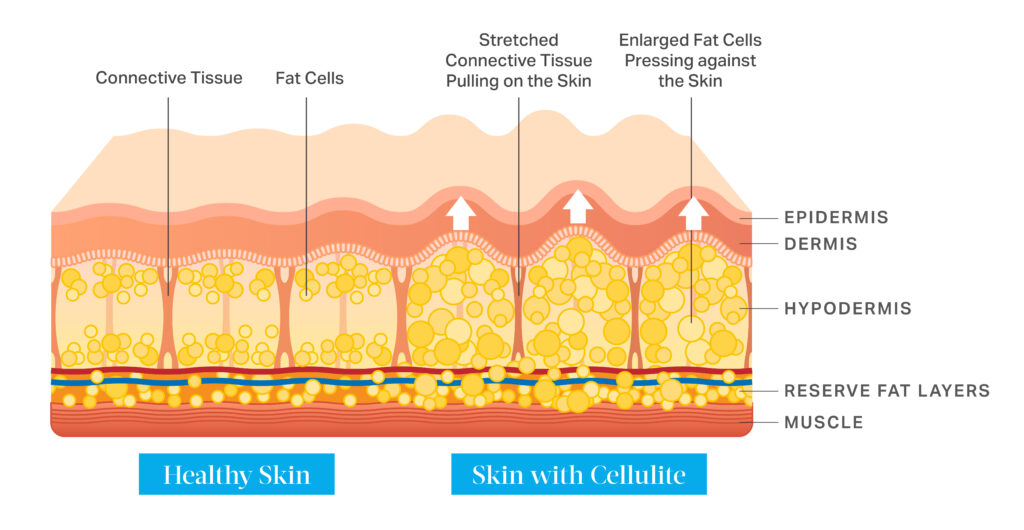February 11th, 2025
Dr. Mulholland, Md
Cellulite is a common insecurity that many women struggle with. In fact, it’s estimated that around 80-90% of women have some cellulite on their body, it’s just more noticeable in others. Cellulite has a dimpling or lumpy appearance and occurs on the legs, thighs, and buttocks. While harmless, it can negatively impact your confidence level and overall appearance.
It’s important to note that cellulite is not necessarily caused by weight gain. Weight gain or loss does not cause cellulite on its own. Instead, a combination of genetics, hormones, and lifestyle habits can lead to this unwanted dimpling.
Toronto Plastic Surgeons and the TPC clinic are cellulite treatment experts. They offer innovative treatments that can provide long-lasting results. Here’s what you need to know:
What Is Cellulite and Why Does It Happen?
Cellulite is a structural skin issue that causes dimpled, lumpy skin. When excess fat is deposited between connective fibrous bands, it pulls down on the skin, causing dimpling. Cellulite is most common in the thighs, buttocks, and hips. However, some individuals also have cellulite on their abdomen.

While weight loss might help improve your appearance, it can’t eliminate cellulite all on its own. In some cases, rapid weight loss can leave loose or sagging skin, worsening the appearance of cellulite.
Common Myths About Cellulite (Debunked)
With a quick Google search, you’ll find that there are many myths about cellulite. It can be challenging to know what’s true and what’s not about cellulite and treatment options. We’re here to debunk the myths for you.
“Liposuction Removes Cellulite” – FALSE
Liposuction is an innovative cosmetic treatment that removes excess fat cells from a specific area. The treatment does not remove fibrous bands, which is what causes cellulite.
“Only Overweight People Get Cellulite” – FALSE
Cellulite is not solely caused by weight gain. It’s typically caused by a combination of issues like changes in skin structure, hormones, and genetics. This is why thin women and athletes also have cellulite.
“Topical Creams Can Permanently Remove Cellulite” – FALSE
Topical creams formulated with caffeine and retinol can help temporarily reduce the appearance of cellulite. However, the topical cream can’t penetrate the skin’s natural barrier to reach the fat cells or fibrous bands causing the cellulite.
“Massage Devices Eliminate Cellulite” – FALSE
Massage devices can temporarily improve circulation, reducing fluid retention and temporarily removing cellulite. However, massages can’t break down the fibrous bands underneath the skin, which causes cellulite.
“Detox Diets or Teas Can Eradicate Cellulite” – FALSE
There’s no scientific evidence proving that detox diets can remove fibrous bands. Healthy lifestyle changes and a nutrient-rich diet can help improve skin health and help you achieve a healthier weight. However, it can’t magically dissolve structural tissue that causes cellulite.
“Dry Brushing or Scrubs Permanently Reduce Cellulite” – FALSE
Dry brushing can help improve circulation, eliminate dead skin, and help with lymphatic drainage. These treatments can temporarily improve your skin’s appearance but won’t alter the underlying septae. The underlying septae are the bands tethering the skin underneath, causing the cellulite.
“Tanning Hides Cellulite for Good” – FALSE
Tanning can help darken your natural skin tone and boost your confidence. However, it can’t remove the appearance of cellulite. Prolonged UV exposure can impact your skin’s integrity, damaging collagen and weakening the skin. This can make your cellulite more pronounced if you aren’t careful.
The Best Medical Treatments for Cellulite
The global market for cellulite treatments (including topical creams and energy-based devices) is projected to exceed $1 billion annually, yet consumer satisfaction remains relatively low for over-the-counter solutions.
If you have troubling cellulite you want to eliminate, there are other treatments you can consider. These treatments offer long-lasting results for individuals struggling with stubborn dimpling. Here’s how they compare:
Cellulase: The Leading Long-Term Treatment for Cellulite
Cellulaze uses a tiny laser probe to break down fibrous bands beneath the skin. This is a minimally invasive, FDA-cleared treatment and patients typically see long-lasting results that last up to 12 months.
Cellulaze also offers results that last longer than energy-based treatments or injectables. If you’re interested, consider scheduling a consultation with Toronto Plastic Surgeons. He’ll sit down with you to discuss your concerns and desired goals. He’ll also create a personalized treatment plan using Cellulaze.
Injectable Treatments (QWO)
Injectables are an FDA-approved treatment to help eliminate cellulite. Most patients need to go through multiple sessions to get their desired results but the results are long-lasting. However, patients may experience bruising and swelling after each of the sessions.
Energy-Based Treatments (Radiofrequency, Ultrasound, Laser, Acoustic Wave Therapy)
Energy-based treatments use radiofrequency or ultrasounds to stimulate collagen production and tighten the skin. The treatments are minimally invasive and require minimal downtime. However, patients may need ongoing sessions to get their desired results.
Mechanical & Surgical Treatments (Cellfina & Subcision)
There are also surgical and mechanical treatments available for cellulite. Cellfina is an FDA-cleared mechanical treatment that uses a thin blade to release septae. The results last up to three years. However, patients may experience swelling and bruising after the treatment. You also need to set aside a few weeks of recovery time.
Subcision is a surgical option available to treat cellulite. During this cellulite treatment, a plastic surgeon will cut the fibrous bands beneath the skin. The treatment is similar to Cellfina but more invasive. Patients may experience pain, swelling, and tenderness. There is also a risk of scarring.
Wrapping up
If you’re tired of stubborn cellulite affecting your appearance, Toronto Plastic Surgeons is here to help. Our team at Toronto Plastic Surgery is here to help find the best cellulite treatment plan for your cellulite. We’ll develop a personalized treatment plan that aligns with your desired goals.
Contact us today for a free, no-obligation quote to get started.



